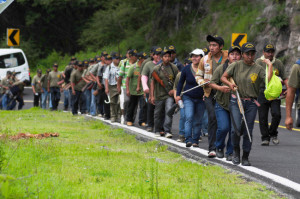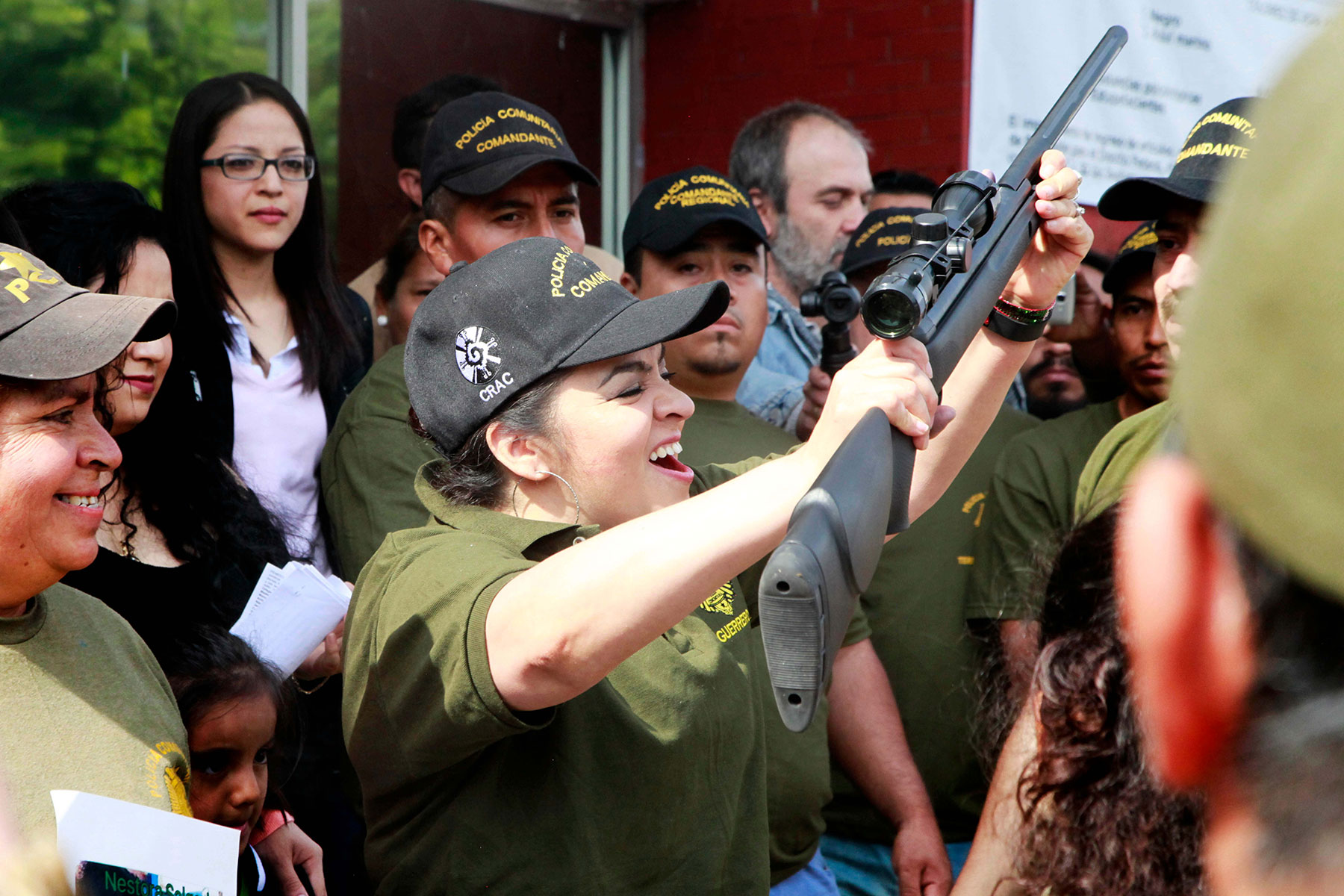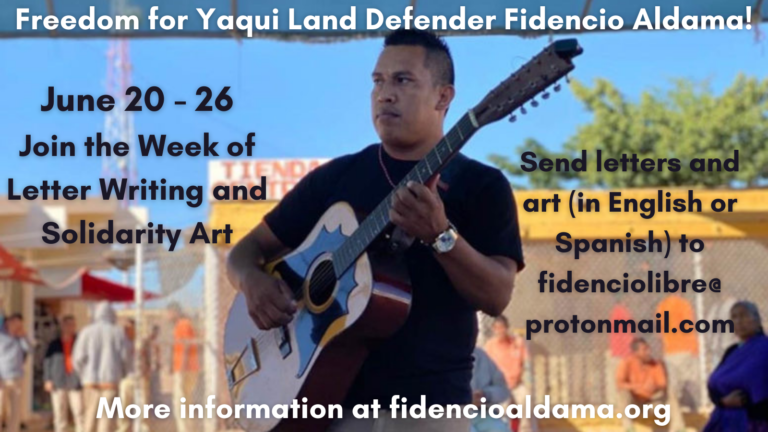EEC note: After seventeen months in prison and following a national and international campaign for her release, political prisoner Nestora Salgado was released from Tepepan prison in Mexico City on March 18, just days after the below essay was published. The commander of the Community Police in Olinalá, Guerrero, Salgado was charged with three counts of kidnapping. When those charges were dismissed, the state filed three more charges for kidnapping, theft and murder. Again, those charges were dismissed for lack of evidence.
Upon exiting the prison, she was received by dozens of community police officers from Olinalá and other towns in Guerrero. Handed a rifle and addressed as commander, she said, “We are going to keep struggling so they don’t keep repressing us. If this is needed [raising the rifle], then this is where we will go, but we won’t allow them to keep trampling on us.” At a press conference later in the day, she committed herself to fighting for the freedom of Mexico’s 500 political prisoners, in particular those jailed for carrying out their duties as community police. Joined by members from the Peoples Front in Defense of the Land from Atenco, those resisting the construction of the La Parota dam in Guerrero, and family members of the 43 disappeared students from Ayotzinapa, she led the count from 1 to 43. “I don’t represent any political party,” she said. “I only fight for my people. Sometimes they ask me if I’m afraid. And yes, I’m afraid, but I’ll die fighting for our people’s dignity. It doesn’t matter what I have to do, I am going to win freedom for our prisoners. I will be present in all of the struggles, as long as they need me.”
By Nestora Salgado
Tlachinollan Human Rights Center of the Mountain
March 14, 2016
Translated by Scott Campbell
I was born free. I grew up in an indigenous village. Magical for its natural charm. I am honored to say that in Olinalá live a unique and capable people. Not only because it is a village of internationally renowned painters, but because we are a people who know how to fight and defend ourselves. In spite of our mestizaje, our life and our institutions have indigenous roots. We are of the Naua people. Los Tlacuilos of yesteryear. We still maintain the pre-Hispanic techniques for varnishing chests or boxes, which we produce with natural dyes. In the palaces of kings and rulers, there will always be, as an artisanal jewel, a box from Olinalá, enshrined with the landscapes of the lowland jungle and the dreams of the Olinalans.
Olinalá, a land in motion that taught me to value the work of the campesinos and to forge my fierce spirit. As a child I accompanied my parents to the fields to help with the planting and harvesting of corn. The wet earth strongly reminds me of those happy moments of my childhood, when the corn sprouted. My siblings, who I so admire, continue plowing the land.
I am the daughter of a poor, hard-working family that is not uncaring. I grew up with much scarcity, struggling to survive, tearing at the soil to grow corn and beans. I thank my parents who supported my studies in grade school and encouraged me to attend at least two years in high school in Mexico City.
The hillsides where we plant are insufficient to sustain the whole family. In this small town we also face land grabs by powerful groups with ties to those in power at the state level. Although the lands are fertile, the majority of them are allocated to build pastures for raising cattle.
To paint and to plant has been our destiny, but in deplorable conditions. Because of this, many of us young people have had to leave the village in order to seek a life in the city. Since the 60s, several of our townspeople, with the help of coyotes from Puebla, were able to cross the border to enlist as waiters and cooks in restaurants in New York.
As a woman, I learned to find my way alone. At 13 years of age, I left Olinalá to study and work in Mexico City. I went to the U.S. without papers and managed to find work and persisted in learning English. I never forgot my people, let alone felt ashamed of my indigenous origins, on the contrary, I reasserted my identity and made a greater commitment to do something for those who suffered most.
The discrimination I was subjected to in the United States helped me to further clarify my struggle in support of the indigenous population, who are the most despised and trampled upon by the traitorous governments. I never uprooted myself from Olinalá, much less ignored the problems they have faced in different critical moments. Unfortunately, those who have governed us have been insolent, because they have surrounded themselves with criminals and have turned local authority into an authority linked to criminal groups. For 25 years our municipality has been held hostage by crime. Its location is an ideal route for the trafficking of drugs and stolen vehicles. It is the point of entry to the states of Puebla, Morelos and the northern part of Guerrero. Its lightly traveled roads were transformed into trails of crime. The population was aware of all this, however they didn’t react or complain, because their security and assets weren’t at risk.
The politicians consolidated their power thanks to this mess which linked up with criminal interests at the state and national level. In the past two decades, Olinalá stopped being a picturesque province, famous for its lacquers. The region became militarized under the pretext that there was the presence of armed groups. There were several military incursions into the main population center as well as various indigenous villages, both in Olinalá as well as Ahuacotzingo. Teachers and indigenous people were arrested. The Naua community of Temalacacingo was militarized for several years. The army built a base on communal lands in order to keep the indigenous population who belonged to independent social organizations such as the Emiliano Zapata Union of Organizations and Communities (UOCEZ) under strict surveillance.
The paradox of the militarization as counterinsurgency strategy that occurred in Guerrero, is that the use of force wins out over the law and tramples on human rights. As well, the military becomes indulgent towards groups that commit crimes because these groups turn out to be useful to their strategy, they are part of the irregular groups that are used by military authorities to carry out their dirty work against enemies of the regime. In times of war, crime is put to work on the side of the government. It’s not just an ally but an important part in the conflict, to the extent that it gains in strength and turns into a real power that carries out military actions to destroy not just its enemies but those players who are inconvenient for the government.
The social breakdown in the region occurred in the context of militarization and serious human rights violation. The collapse came, with kidnappings, murders, disappearances, and extortions of the general population. In spite of the denunciations and the identifying of the homes and people who committed crimes, the authorities in the three levels of government did not act to contain the spiral of violence. Now that the people were asking for the army to come and dismantle the criminal groups, the government shrugged off the request, arguing that it couldn’t be done.

The people had no other option but to arm themselves. They rang the church bells, they took the streets, and decided to detain the municipal police who were in league with the criminals, and took the security of the people upon themselves. October 27, 2012 was the crucial day for Olinalá because the people took up arms, not to make war, but to return to the people the tranquility and peace that the authorities didn’t care to ensure.
The community police emerged, through the supreme will of the people. It was not one group or one person’s decision. It was first born in the Olinalan community assembly in charge of organizing security, however, a more stable structure was needed that would undertake the hard work of combating organized crime and bringing order to the streets.
It was in an assembly where the people named me as their commander. The same men decided to place me at the front, to take on the commitment to the people of facing those who threatened life and safety. We did it to the letter, and because of this we had to face the army, who instead of patrolling the streets at night joined up with groups of thugs to drink beer in public. The same things happened with the Marines. We tried to coordinate some operations with them, but we saw that they didn’t want to take action against the criminal leaders. Rather they taught us how to fabricate charges, showing us bags of marijuana and old weapons to plant on arrestees.
Questioning the president for his lack of commitment to the people and his closeness to criminal groups led to pressure at the state level to stop our work as community police. First the governor tried to persuade us to integrate ourselves into the rural police. He later used Eliseo Villar, who by then had received several million pesos to build and operate houses of justice, who he tasked with challenging our authority and on one occasion he tried to disarm me. I did not allow it. The group of police who accompanied me quickly responded and were able to surround the police who guarded him. I faced him and challenged him to disarm me. He knew I wasn’t going to back down and that he wasn’t going to get away with it. For that reason we joined with the El Paraíso House of Justice and with Gonzalo Molina and Arturo Campos, with whom I coordinated and carried out my work, following the internal guidelines of the Regional Coordinator of Community Authorities (CRAC).
For obeying my people, for rebelling against the authorities and for accepting the mandate of commander of the community police no matter the consequences, the government considered me a threat to their criminal interests. Because of that they imprisoned me. They sent me to Nayarit, far from the people who struggle and fight for change. They thought I was going to break, that I would repent and ask for forgiveness. Today I feel stronger and without fear of anything. I feel more confident and convinced of what I did inside the community police. I will return to the ranks of the CRAC. I will gain my freedom. My struggle was to fight against those who with their power vilify the people, against those who commit crimes in the shadows of the offices they hold. I will never forget what I first learned as a child in the fields, to be a free person, to fight against injustice, to never relent to the abusers, and to always be at the command of my people. I was born to be free and to defend my people. That is what I will affirm with my compañeros and compañeras of the CRAC upon taking my first step out of prison.



